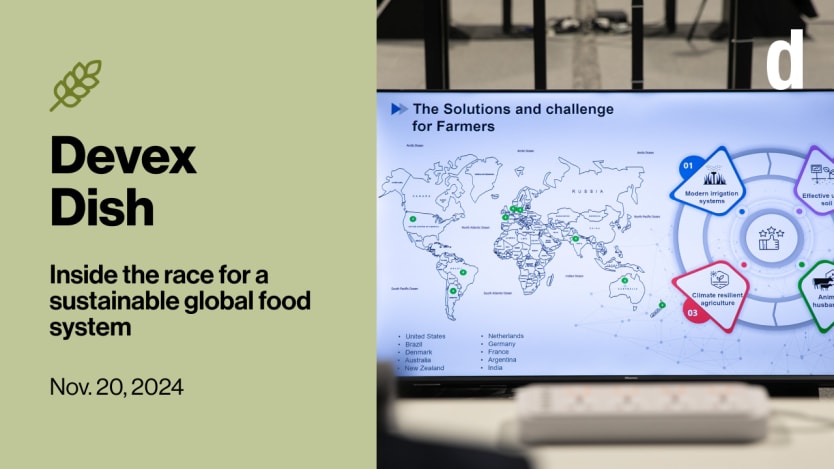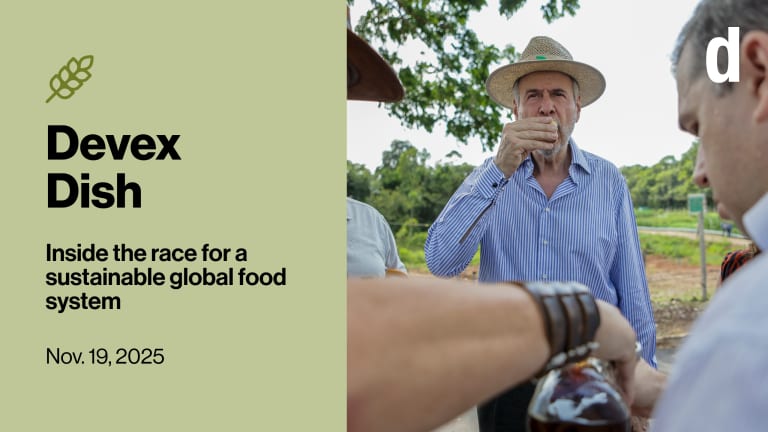
Greetings from Azerbaijan, the world’s second-largest exporter of persimmons — a fruit Ayenat confesses she’s never tried.
They’re said to be soft and zingy, much like the current state of negotiations here at the United Nations climate conference, COP29. Soft, because we’re still waiting for actual numbers when it comes to the new global climate finance target. And zingy, because the gap between what’s being asked for and what’s on offer remains strikingly sharp.
Lower-income countries are seeking $1.3 trillion per year, civil society groups such as the World Wildlife Fund point to $1 trillion, and European countries are reportedly talking about $200 billion to $300 billion.
A significant share of that funding must be dedicated to adaptation, lower-income countries maintain, along with a focus on supporting farmers — particularly the smallholders who produce up to 80% of food in places like Africa and Asia, but get a tiny portion of climate finance.
That message was particularly resounding at yesterday’s Food, Agriculture & Water Day at COP29. The food systems community is thrilled to see food in the spotlight at COP for the second year in a row — proof that it’s now a permanent fixture in the climate conversation.
The next challenge is ensuring farmers’ voices are truly heard. “Farmers should be involved not as observers only — but as co-designers of policy and action that will impact them, their family and their livelihoods,” Andrea Porro, secretary-general of the World Farmers’ Organisation, tells Ayenat.
Given farmers’ particular vulnerability to climate change, the organization is also emphasizing the need to put them at the center of loss and damage discussions, and include them in the governance of the loss and damage fund that was agreed in 2022, Porro says. While formal agreements for the fund were signed last week, enabling it to begin receiving contributions, there has been minimal progress during COP29.
This week has also seen a buffet of announcements:
• The government of Azerbaijan, together with the Food and Agriculture Organization, officially launched the Baku Harmoniya Climate Initiative for Farmers, which aims to bring together various agricultural initiatives and projects to facilitate access to finance and foster collaboration — particularly among women and youth.
• More than 30 countries signed on to the Declaration on Reducing Methane from Organic Waste. The impacts could be huge — food loss and waste are responsible for up to 10% of annual greenhouse gas emissions. Stay tuned for a special COP29 podcast episode later this week all about methane.
• Since its launch three years ago at COP26, the Agriculture Innovation Missions for Climate initiative — better known as AIM for Climate — has mobilized $29.2 billion from more than 800 government and nongovernment partners.
• The AIM for Scale consortium unveiled at COP28 announced $1 billion in new and existing investments for better weather forecasting for farmers across Asia, Latin America, and Africa. Contributions through the initiative, which is led by the Gates Foundation and the United Arab Emirates, come from the Asian Development Bank, Inter-American Development Bank, World Bank, USAID, and NASA.
• The Alliance of Champions for Food Systems Transformation — comprised of the governments of Brazil, Cambodia, Norway, Rwanda, and Sierra Leone — reconvened to track progress on the COP28 UAE Declaration on Sustainable Agriculture, Resilient Food Systems and Climate Action (and yes, these names just roll off the tongue). They called on governments and financial institutions to prioritize climate finance for food systems. Tanzania announced it will join the alliance.
As always, what remains to be seen is how big announcements will translate to real-world action. Countries are also busy finalizing their new climate action plans, or nationally determined contributions, aka NDCs, due out in early 2025. We’ll be watching to see how action on food systems is integrated.
Catch up on our COP29 coverage:
• Reporter’s notebook — Behind the scenes at COP29
• COP29 special edition newsletter — Halfway through the summit, here’s what you need to know
• Podcast episode — At COP29, leaders push for adaptation finance
• The Pro read — COP29 is the ‘finance COP.’ Here’s what that means
+ Not yet a Devex Pro member? Start your 15-day free trial today to access all our expert analyses, insider insights, funding data, and exclusive event coverage. Check out all the exclusive content available to you.
Overheard in Baku
“It’s what’s been done over the last four years that provides confidence. It isn’t going to be the Biden administration that continues this — it’s gonna be the people who have received the benefit of the Biden administration, who understand the significance of what we’ve invested in. There’s a groundswell, a momentum that I don’t think an incoming administration, regardless of its attitudes about climate or whatever, would be in a position to stop.” — U.S. Secretary of Agriculture Tom Vilsack on what he’s doing to protect the Biden administration’s legacy.
“Our hope for this COP is — particularly when there's so much discussion about adaptation finance — that there will be strong commitments to address adaptation and link it to small-scale farmers. Why? Because right now, as much as we talk about climate finance, depending on the calculation, only about [$1] of every $100 invested in climate finance goes to small-scale farmers. We estimate that proper climate adaptation among small-scale farmers will require flows of up to $75 billion a year.” — Juan Carlos Mendoza, director of the International Fund for Agricultural Development's environment, climate, gender and social inclusion division.
“If family farmers like us were a corporation, we would be too big and too important to fail. Because small-scale farmers produce 70% of food consumed in Africa and 80% in Asia, and we are at the center of global supply chains for commodities such as rice and coffee. … Despite this, just 14% of global public-private finance for food and agriculture is spent on helping small-scale producers adapt.” — Esther Penunia, secretary-general, Asian Farmers’ Association, and founding member of Family Farmers for Climate Action.
“I hope that this [Denmark’s world-first emission tax on agriculture] will prove to the world that you can introduce a carbon tax in the agricultural sector, that the incentives linked to such a tax are working as they should … and we hope that other countries will follow suit. … Specifically we hope it will be an inspiration for the upcoming discussion in the EU to decide the future of European agricultural policy.” — Lars Aagaard, Denmark’s minister for climate, energy, and utilities. (The country approved the tax on Monday.)
Background reading: Lessons from Denmark’s plan to tax farmers for livestock emissions
A mouthful
“The climate movement simply cannot afford to leave farmers behind.”
— Ismahane Elouafi, executive managing director of CGIAR, and Kaveh Zahedi, a director at FAOIt’s not just the energy sector that needs a “just transition” — agriculture does, too, and it deserves the same prominence at COP29, Elouafi and Zahedi write in an opinion piece for Devex. The principles of the just energy transition are meant to ensure no people, sectors, or countries are left behind in the drive to avoid a climate crisis. And the move to resilient, low-emissions agrifood systems should follow those same principles.
Opinion: Farmers cannot lose out in the race to net-zero
Meanwhile in Rio
On the other side of the planet, Brazilian President Luiz Inácio Lula da Silva opened the annual gathering of the world’s largest and emerging economies — the G20 Summit — with an announcement one year in the making: The Global Alliance Against Hunger and Poverty is finally live.
The G20-born initiative aims to connect countries with the policies, partnerships, and resources they need to end hunger. Since last year, Brazil’s G20 presidency has steered that work, and by Monday, 82 countries, 24 international organizations, 31 philanthropies and nonprofits, nine financial institutions, and the European and African unions had signed on.
Through a team headquartered at FAO in Rome, the alliance will serve as a global matchmaker: It will help countries connect to the resources, expertise and financial support that they need to implement evidence-based policies, writes our colleague Elissa Miolene, who is in Rio de Janeiro. Because of that, it differs from the global agriculture fund, the Global Agriculture and Food Security Program, or GAFSP, created by the G20 nearly 15 years ago — though the entity did commit up to $182 million in financing for the new project.
“This will be our major legacy,” said Lula on Monday. “With this alliance, we will network international recommendations, efficient public policies, and financing sources.”
Read more: Brazil launches a G20 plan to slash hunger across the world
Read the reporter's notebook: On the ground for Rio's G20 summit
Bringing home the bacon
Your next job?
Grantwriter
Sustainable Agriculture Network
Remote (United Kingdom, United States, and Europe)
Chew on this
More than 200 lobbyists for the world’s largest agribusiness companies are at COP29, and 40% have traveled with country badges, which lends them privileged access to the diplomatic negotiations. [DesMog]
Acumen, a nonprofit impact investor, will commit $300 million to boost climate adaptation for smallholder farmers. [Devex]
WWF has a toolkit to help countries integrate food systems transformation into their NDCs, national adaptation plans, and biodiversity plans. [World Wildlife Fund]
The U.S. Senate has released its draft of the five-year farm bill. [Agriculture Dive]
Elissa Miolene contributed to this edition of Devex Dish.









